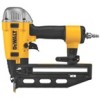Dewalt DWFP71917 Instruction Manual - Page 9
Mode Selection - nailer
 |
View all Dewalt DWFP71917 manuals
Add to My Manuals
Save this manual to your list of manuals |
Page 9 highlights
English Mode Selection WARNING: Always wear proper eye [ANSI Z87.1 (CAN/CSA Z94.3)] and hearing protection [ANSI S12.6 (S3.19)] when operating this tool. WARNING: Keep fingers AWAY from trigger when not driving fasteners to avoid accidental firing. NEVER carry tool with finger on trigger. In contact mode tool will fire a fastener if safety is bumped while trigger is depressed. The DWFP71917 features a selectable trigger system that allows the user to choose between the following modes of operation Sequential Trip The Sequential Trip requires the operator to hold the tool against the work before pulling the trigger. This makes accurate fastener placement easier. The Sequential Trip allows exact fastener location without the possibility if driving a second fastener on recoil as described under Contact Trip. The Sequential Trip Tool has a positive advantage because it will not accidentally drive a fastener if the tool is contacted against the work surface - or anything else while the operator is holding the trigger pulled. Contact Trip The common operation procedure on "Contact Trip" tools is for the operator to contact the work surface to actuate the trip mechanism while keeping the trigger pulled, thus driving a fastener each time the work surface is contacted. This will allow rapid fastener placement on many jobs. All pneumatic tools are subject to recoil when driving fasteners. The tool may bounce, releasing the trip, and if unintentionally allowed to re-contact the work surface with the trigger still actuated (finger still holding the trigger pulled) an unwanted second fastener will be driven. TO CHANGE OPERATING MODES (FIG. 1-3) WARNING: Disconnect air line from tool and remove fasteners from magazine before making adjustments or personal injury may result. SEQUENTIAL TRIP ACTION Use sequential action for intermittent nailing where very careful and accurate placement is desired. To operate the nailer in sequential action mode: 1. Rotate the trigger mode selector FIG. 2 (B) clockwise to the sequential action position , as shown in Figure 2. 2. Fully depress nosepiece against the work surface. 3. Pull trigger. 4. Release trigger. 5. Lift nosepiece off work surface. 6. Repeat steps 2 through 4 for next application. WARNING: The contact trip needs to be depressed followed by a trigger pull for each fastener followed by a release of both the contact trip and trigger after each fastener. CONTACT TRIP ACTION Bump/contact action is intended for rapid nailing on flat, stationary surfaces. When using bump action, two methods are available: place actuation and bump actuation. 7















